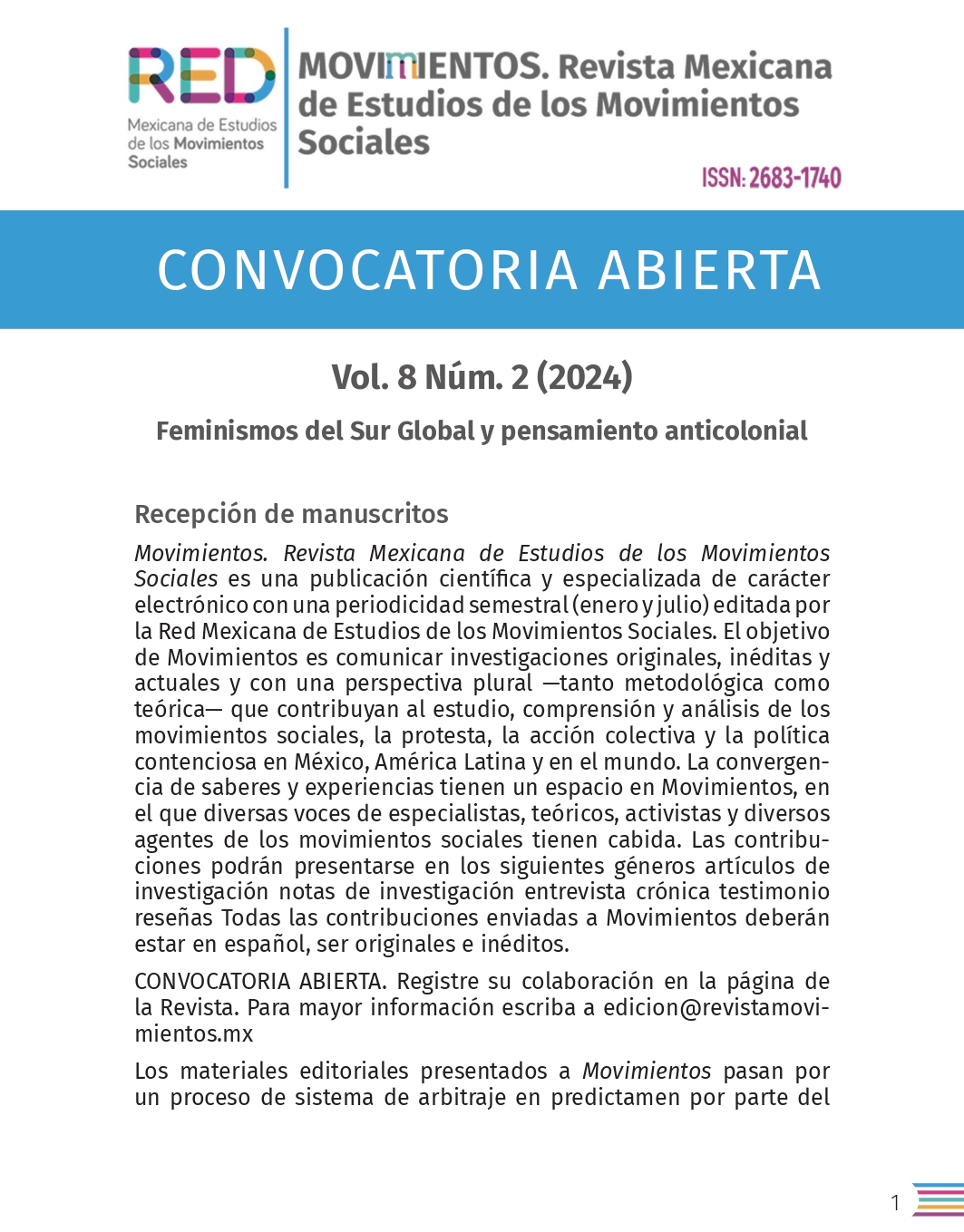Los marcos del discurso de la Cuarta Transformación
Resumen
En la elección presidencial de México 2018, López Obrador se presentó como el candidato de una coalición de varios partidos políticos y líder de un movimiento social. Morena (Movimiento de Regeneración Nacional) surge como un movimiento social que se transforma en partido y su líder se convierte en presidente de la República. Estos rasgos particulares sitúan esta investigación en la frontera entre dos campos (los movimientos sociales y los estudios electorales) que han permanecido con escasa comunicación entre uno y otro. En este artículo se propone el modelo de los marcos del discurso como una perspectiva interdisciplinaria que destaca la centralidad del concepto de marco como piedra angular en el desarrollo de una teoría del discurso público. El líder comunica su visión de cambio social, inicia un proceso de ruptura con el marco dominante (la corrupción) y lo sustituye por el marco de un nuevo orden político y social (la 4T). El marco de la Cuarta Transformación consiste en el proceso de cambio social que continúa las tres transformaciones más importantes de la historia de México.
Descargas
Citas
Berger, P. y Luckmann, T. (1966). The social construction of reality: A treatise in the sociology of knowledge. Anchor.
Bourdieu, P. (1977). Outline of a Theory of Practice. Cambridge University Press.
Chihu, A. (2021). Frames de la comunicación política. Spots de las campañas presidenciales 2000-2018. Gedisa.
Chihu, A. (2018). Frames del discurso público en la arena política del 68. Polis, Anuario de Sociología 14(1), 81-105. https://doi.org/10.24275/uam/izt/dcsh/polis/2018v14n1/Chiu
Chihu, A. (2013). Earth's Color March”. En The Wiley-Blackwell Encyclopedia of Social & Political Movements, (pp. 381-382). Hoboken: Wiley-Blackwell. https://doi.org/10.1002/9780470674871.wbespm276
Chihu, A. (2012). La teoría del framing: un paradigma interdisciplinario. Acta Sociológica, (59), 77–101. https://doi.org/10.22201/fcpys.24484938e.2012.59.33119
Chihu, A. (2007). Marcos interpretativos, identidad e imaginario en el mexica movement. región y sociedad, 19(38), 51-76. https://doi.org/10.22198/rys.2007.38.a557
Chihu, A. (2006). El análisis de los marcos en la sociología de los movimientos sociales. Miguel Ángel Porrúa-UAM-Iztapalapa.
Chihu, A. (2002). Sociología de la identidad. Miguel Ángel Porrúa-UAM-I.
Chihu, A. (1999). Estrategias simbólicas y marcos para la acción colectiva. Polis, Anuario de Sociología (99), 41-65. https://polismexico.izt.uam.mx/index.php/rp/article/view/364/359
Donati, P. (1992). Political discourse analysis. En M. Diani y R. Eyerman (Eds.), Studying collective action (pp. 136-167). Sage Publications.
Edelman, M. (1964). The symbolic uses of politics. University of Illinois Press.
Entman, R. (2004). Projections of power: Framing news, public opinion, and US foreign policy. University of Chicago Press.
Gamson, W. y Modigliani, A. (1989). Media discourse and public opinion on nuclear power: A constructionist approach. American journal of sociology, 95(1), 1-37. https://www.jstor.org/stable/2780405
Goffman, E. (1974). Frame Analysis: An Essay on the Organization of Experience. Harper and Row.
Halbwachs, M. (2004). Los marcos sociales de la memoria. Anthropos.
Hare, P. y Blumberg, H. (1988). Dramaturgical analysis of social interaction. Praeger Publishers.
Kinder, D. y Sanders, L. (1990). Mimicking political debate with survey questions: The case of white opinion on affirmative action for blacks. Social Cognition 8(1), 73-103. https://doi.org/10.1521/soco.1990.8.1.73
Melucci, A. (1989). Nomads of the Present: Social Movements and Individual Needs in Contemporary Society, Hutchinson Radius.
Moscovici, S. (1979). El psicoanálisis: su imagen y su público. Huemul.
Moyer, B., MacAllister, J. y Soifer, S. (2001). Doing democracy: The MAP model for organizing social movements. New Society Publishers
Piaget, J. (1970). Naturaleza y métodos de la epistemología. Proteo.
Piven, F. y Cloward, R. (2012). Poor people's movements: Why they succeed, how they fail. Pantheon.
Snow, D. (2013). Framing and social movements. En D., Snow, D. Della Porta, B. Klandermans y D. McAdam (Eds.), The Wiley-Blackwell Encyclopedia of Social & Political Movements (pp. 470–475). Blackwell.

Esta obra está bajo licencia internacional Creative Commons Reconocimiento-NoComercial-SinObrasDerivadas 4.0.

Movimientos. Revista Mexicana de Estudios de los Movimientos Sociales by Red Mexicana de Estudios de los Movimientos Sociales is licensed under a Creative Commons Reconocimiento-NoComercial-SinObraDerivada 4.0 Internacional License.
Creado a partir de la obra en http://www.revistamovimientos.mx/2016/index.php/movimientos.


